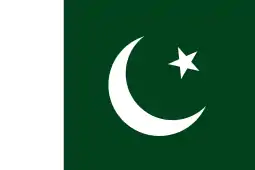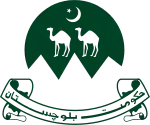Ahmad of Kalat
Mir Sir Ahmad Yar Khan Ahmedzai GCIE (1902–1979) was the last Khan of Kalat, a princely state within British India and the Dominion of Pakistan, serving from 10 September 1933 to 14 October 1955.
| Ahmad Yar Khan | |
|---|---|
| Khan of Kalat | |
| Khan of Kalat | |
| Titular Pretender | 1933–1947 1947–1955 |
| Predecessor | Mir Mohammad Azam Jan Khan |
| Successor | Mir Suleman Dawood Jan (as pretender) |
| Born | Ahmad Yar Khan Ahmedzai 1902 Khanate of Kalat, British India (present-day Balochistan, Pakistan) |
| Died | 1979 (aged 77) Kalat, Balochistan, Pakistan |
| Urdu Pashto | احمد یار خان احمدزی احمد يارخان احمدزى |
Mir Ahmad Yar assumed his throne in 1933, and was decorated by the British in the 1936 New Year Honours as a Knight Grand Commander of the Most Eminent Order of the Indian Empire (GCIE).[1]
He declared Kalat's independence from the British Empire on 15 August 1947, hoping British Prime Minister Clement Attlee would honour his pledge to respect the self-determination of the Princely States. Yar Khan had served as an agent of British intelligence services in the 1920s, reporting on Russian influence and the spread of pro-Marxist sympathy among the poorer Baloch subjects.[2] He appointed Douglas Fell, a Briton, Foreign Minister of Kalat in an effort to curry favour with the British government. Despite his nationalist aspirations, Muhammad Ali Jinnah was Yar Khan's legal adviser in the early 1940s.[3] Jinnah persuaded Yar Khan to accept Pakistani rule but the Khan stalled for time. After a period of negotiations, Khan finally decided to accede to Pakistan on 27 March 1948.[4][5][6] Yar Khan signed a treaty of accession, submitting to the federal government. His younger brothers, Prince Agha Abdul Karim Baloch, revolted against his decision. Abdul Karim took refuge in Afghanistan to wage an armed resistance against Pakistan. The Prince fought a lone battle without support from the rest of Balochistan. As a result, the Prince surrendered to Pakistan in 1950.[7] Jinnah and his successors allowed Yar Khan to retain his title until the province's dissolution in 1955.
He briefly declared himself Khan again in defiance of the Pakistani state from June to October 1958.[8] On 6 October 1958, the Pakistani government arrested and imprisoned Yar Khan on sedition charges during the coup d'état against President Iskander Mirza but later released and briefly restored his title in 1962.[9][10] His arrest triggered an insurgent uprising led by Nauroz Khan in 1959.[11]
Legacy
Yar Khan's eldest son, Mir Suleman Dawood Jan, assumed the title of Khan of Kalat upon his father's death in 1979. On Dawood Jan's death his son Suleman Daud Jan became new Khan of Kalat. He has lived in exile in London since the death of Akbar Bugti in 2006. Chief Minister Abdul Malik Baloch and Sanaullah Zehri have asked him to return to Pakistan. Yar Khan's younger sons, Prince Mohyuddin Baloch and grandson Umer Daud Khan, are both politicians in Pakistan.[12]
Books
- Inside Baluchistan: A Political Autobiography of His Highness Baiglar Baigi, Khan-e-Azam-XIII Mir Ahmad Yar Khan Baluch, Khan-e-Baluch, Ex-ruler of Kalat State (Royal Book Company: 1975)
References
- "No. 34238". The London Gazette (Supplement). 31 December 1935. p. 6.
- Amin Saikal (2004). Modern Afghanistan: A History of Struggle and Survival. I.B.Tauris. p. 267.
- Farhan Hanif Siddiqi (2012). The Politics of Ethnicity in Pakistan: The Baloch, Sindhi and Mohajir Ethnic Movements. Routledge. pp. 56–58.
- Yaqoob Khan Bangash (10 May 2015). "The princely India". Archived from the original on 25 December 2015. Retrieved 22 December 2015.
It was only after a protracted period of negotiations and certain tactics used by the Pakistani bureaucracy, and strange help of All India Radio, that Kalat finally acceded to Pakistan on March 27, 1948.
- "In memory of Khan of Kalat". Nation. Retrieved 21 October 2014.
The Khan announced his affiliation with Pakistan in 1948.
- "Balochistan conundrum: Khan of Kalat's return is a distant possibility". Express Tribune. Retrieved 26 May 2013.
Khan-e-Kalat Mir Ahmed Yar Khan’s decision of ceding the princely state of Kalat to Pakistan at the request of Quaid-e-Azam Muhammad Ali Jinnah in 1948.
- Qaiser Butt (22 April 2013). "Balochistan Princely Liaisons: The Khan family controls politics in Kalat". The Express Tribune.
Prince Agha Abdul Karim Baloch, father of Irfan Karim and younger brother of Khan-e-Kalat Mir Ahmed Yar Khan, had revolted against his brother’s decision of accession of Kalat State to Pakistan at the request of Quaid-e-Azam Muhammad Ali Jinnah in 1948. Abdul Karim took refuge in Afghanistan to wage an armed resistance against Pakistan. However, he ultimately surrendered to Pakistan in 1950
- "Deposed Khan of Kalat restored". Dawn. 7 November 2012.
- Raṇabīra Samāddāra (2007). The Materiality of Politics: Volume 1: The Technologies of Rule, Volume 1. Anthem Press. p. 38.
- James B. Minahan (2002). Encyclopedia of the Stateless Nations: Ethnic and National Groups Around the World A-Z [4 Volumes]. ABC-CLIO. p. 258.
- Farhan Hanif Siddiqi (2012). The Politics of Ethnicity in Pakistan: The Baloch, Sindhi and Mohajir Ethnic Movements. Routledge. p. 71.
- "Khan of Kalat being persuaded to return home". Dawn. 29 June 2015.

